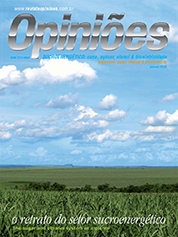Miguel Rubens Tranin
President of Alcopar - Paraná
Op-AA-25
Bioenergy industry: a promising scenario
Like all other economic sectors, Brazil’s bioenergy industry was considerably affected by the world crisis that took place in the last quarter of 2008 and continued throughout 2009, impacting markets and creating a dark scenario that, so one believed, would last much longer. Fortunately, the world was able to overcome this difficult phase, even though many countries continue to register inexpressive economic growth, while however believing in the coming about of better times.
For the industry, the crisis’ impact was felt, mainly due to the postponement of expansion projects, the deceleration of investments, such as in building new production units in several states, or even in the modernization of structures. And, if on the one hand the international ethanol market was faced with the crisis and ceased to develop as expected, in the domestic market demand continued at a high level.
Of course the world recession also affected Brazil – and even the decrease in GDP in 2009 shows the impact was strong, forcing mergers and incorporations to take place in the industry. However, we reacted faster than other countries, picking up growth that may be quite vigorous in 2010, based on what one saw in the first semester.
Anyhow, one can say that, like in other sectors, the current scenario is promising for the bioenergy industry, taking into account, in this context, ingredients of international scope. The shortfall in the production of India in 2008/2009 made Brazil the main world supplier, creating an excellent opportunity for the recovery of production units.
In addition, more recently, the enormous problem, from the environmental perspective, caused by oil exploration in the Gulf of Mexico. This fact, considering that oil sources are increasingly to be found at greater depths, and hence, are subject to accidents like the one mentioned before, resulted in that ethanol is back in the showcase. Being a renewable fuel, extracted from a clean source, ethanol again was elevated to the status of a viable alternative that deserves attention of the international public opinion, placing Brazilian producers in a privileged situation.
Thus, one may nowadays state that the different phases of the production chain in the sugarcane industry, in Brazil, are being compensated. One cannot, as yet, state that such compensation is adequate to foster the picking up of investments, but it is an incentive for who has been performing in this industry for decades and has always been exposed to the ups and downs.
We know there will always be difficulties: however, the preoccupation with seeking competitiveness and working with maximum professionalism, leads us to believe that we are facing the beginning of a new phase for the industry. If in 2010 we were already somewhat relieved, we believe that 2011 will be much better for Brazilian producers.
It is important to point out that financing rates are still very high and there are difficulties to obtain credit given the lack of guarantees. As related to the co-generation of energy, we believe this will occur gradually, whether due to the need for new energy sources or mainly as an alternative to burning sugarcane, given that the use of sugarcane straw in the co-generation process optimizes mills and creates a new source of income.
In Paraná, one of our greatest challenges in coming years is to build a multiple-purpose pipeline linking Maringá, in the North of the state (a distribution center for the domestic market) to the port of Paranaguá. To that end, recently a partnership was formalized between the industry, the state government, Copel (the power utility company) and Compagas.
With this pipeline, whose feasibility is under assessment, one hopes to make even more competitive the ethanol produced in Paraná – and expectations are the pipeline will be ready in 2014, will be about 500 km long and will require investments of about R$ 1 billion. In a second phase, the bioenergy industry of the State of Mato Grosso do Sul is expected to join the project.
With its 30 production units, not to mention the diesel producing ones, Paraná is strongly moving ahead, relying on factors that contribute to its develop-ment. Activities in sugarcane take place in more than 130 municipalities and it is one of the pillars of the State’s economy, generating 85,000 jobs and indirectly another 500,000. In addition, we need to learn the lessons the crisis has taught us and move forward. The future reserves us a special role in this scenario.




